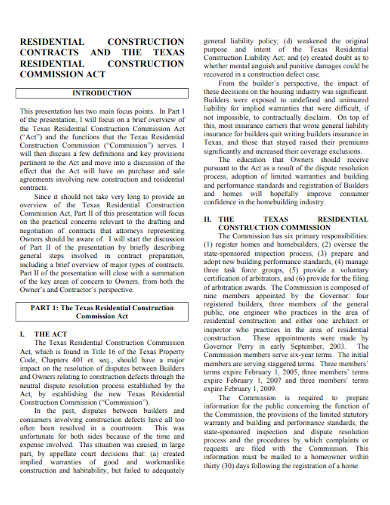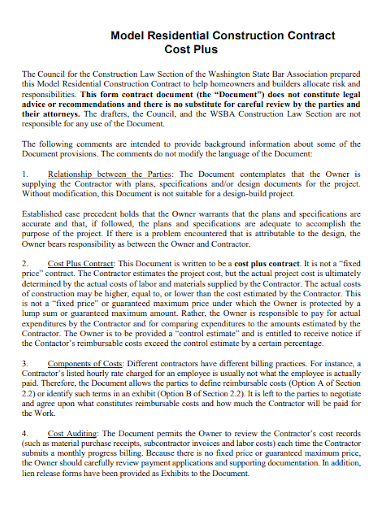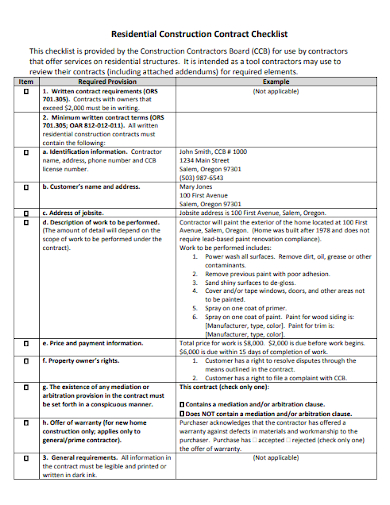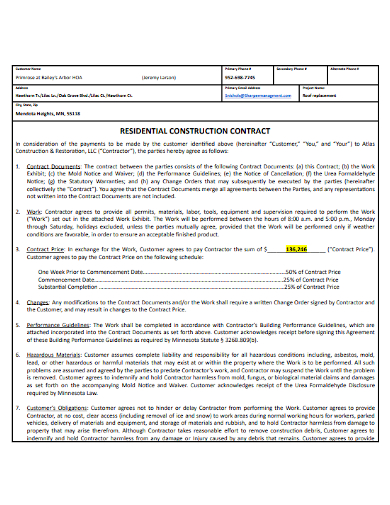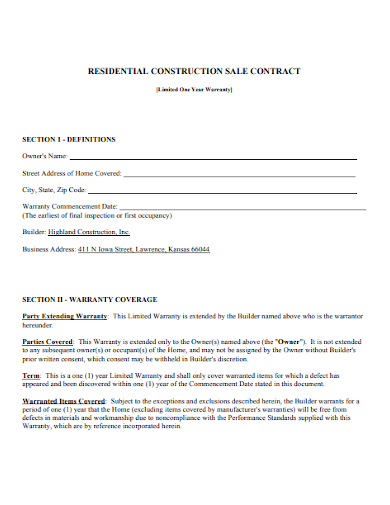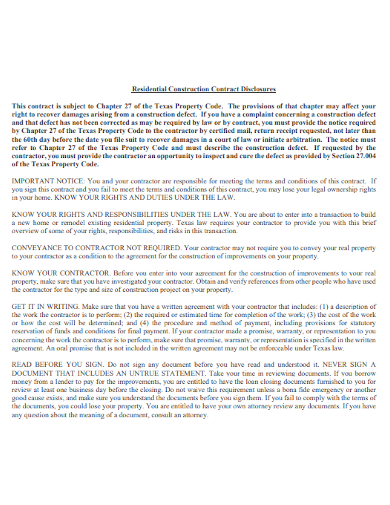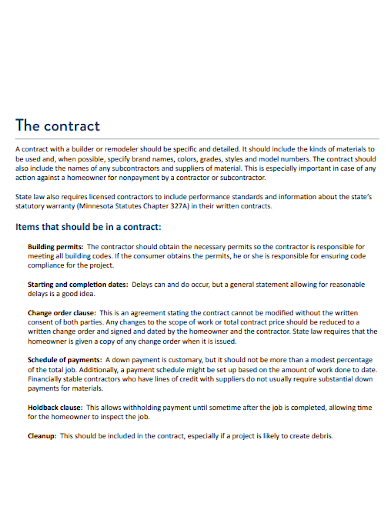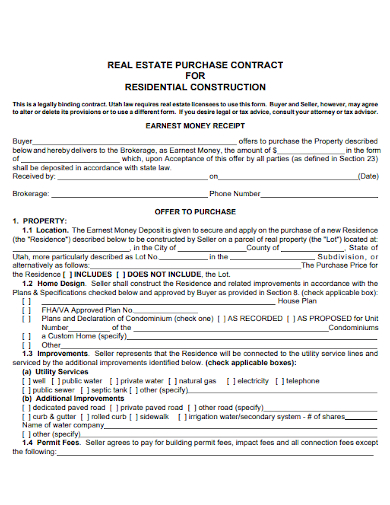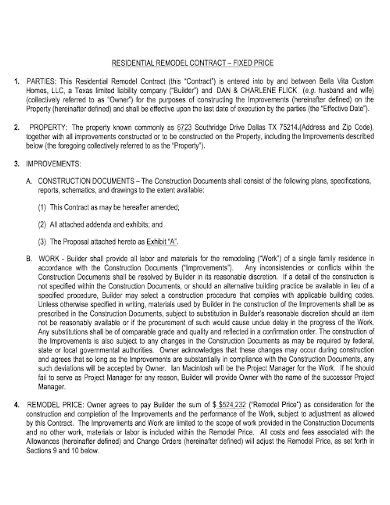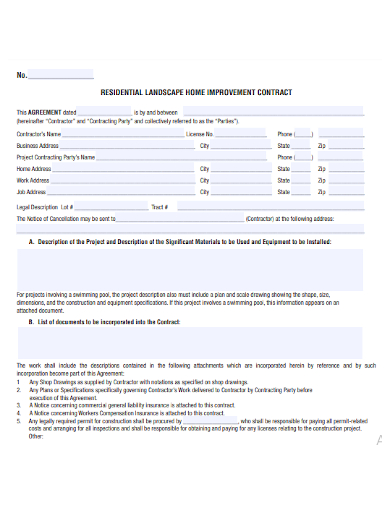Are you working on constructing a home for homeowners? Or renovating an old home to make it more livable for the homeowners or remodeling a home to make it more marketable as the homeowners are planning to sell it on the real estate market? Or are you constructing a new part of a home such as a barn, an extended garage, or a pool? Whatever that construction work is in a residential area, you need to come up with a contract with your client before you start your job even if the job is not as complicated compared to building skyscrapers. This article will guide you on how to make a residential construction contract.
10+ Residential Construction Contract Samples
1. Residential Construction Contract Template
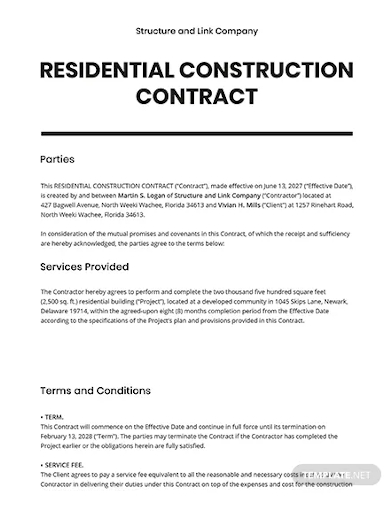
2. Residential Construction Commission Contract
3. Model Residential Construction Contract Cost Plus
4. Residential Construction Contract Checklist
5. Simple Residential Construction Contract
6. Residential Construction Sale Contract
7. Residential Construction Contract Disclosures
8. Editable Residential Construction Contract
9. Real Estate Purchase Contract for Residential Construction
10. Residential Remodel Construction Contract
11. Residential Landscape Home Construction Contract
What is a Residential Construction Contract?
A residential construction contract is a legally binding written document that is used to establish an agreement between a homeowner and construction contractor to cover the services provided, the compensation, the work schedule, how long the construction lasts, and to ensure both parties are protected from any funny business.
Details to Include in A Construction Contract
1. Details About the Parties
The first part of the contract should include information about both the contractor and the client. Include the names, business names, company address of the contractor, phone numbers, email addresses, property’s address of the client, license numbers of the contractor, and the place where the construction work will take place.
2. Description of the Project
The construction contract must describe the scope of the project. Furthermore, the project description should outline the permits or licenses required to complete the project.
3. Timeline
Include details on how long the work will last on the construction project. Include the dates when the contract takes effect when the project starts, and your estimation of when the project completes. Include also the details on what will happen if you can’t complete the work by the time the completion date rolls around.
4. Estimated Costs and Payment Terms
Include in the contract the cost estimate of the whole construction project along with a payment schedule. In terms of payment for the project, you should include payment terms for a non-refundable deposit to officially start your work and include details on what to do regarding late fees.
5. Stop-Work and Stop-Payment Clauses
A stop-work clause is a great clause to protect you. It gives you the legal right to stop working on the construction project if the client hasn’t paid you. The stop-payment clause is a clause that protects the client. It gives the client the right to withhold payment if you don’t accomplish the established project milestones or haven’t delivered the work in a quality level that the client expects you to deliver.
6. Act of God Clause
Sometimes, your plans may not go accordingly to how you envision it such as circumstances that may happen that will prevent you from completing the construction project on time. It’s important to include a clause that will account for these circumstances. This clause is called an Act of God that outlines what will you do if you’ve encountered unexpected situations or issues such natural disasters or material shortage.
7. Warranty
Your client expects the best quality work and if there are any issues with it, you must be willing to take responsibility in fixing it to surpass the quality level of your work. A warranty clause should be included in the contract to ensure that your client can come to you when they want to fix something over your work.
8. Signature Line for Both Parties
Conclude the contract by including signature lines where you and the client can sign the contract along with the date you signed it.
FAQs
What are the four types of contractor contracts?
The four types of contractor contracts are:
- Lump-sum/fixed price: This states the costs of the entire project into a single lump sum or fixed price.
- Cost-plus: A cost-plus contract requires the client to pay for all the costs associated with the project, including labor and materials.
- Time and materials: A time and materials contract sets an hourly or daily rate for the contractor.
- Unit pricing: Unit pricing contracts break down the costs of the project into measurable units.
How much do contractors make?
The average earnings of a general contractor is estimated around $20.80 per hour and $6,562 overtime annually.
What type of contractor makes the most money?
The contractors that make the most money are:
- Construction superintendent
- Civil engineer
- Construction manager
- Boilermaker
- Pipefitter
Once you’re done writing the contract, before you print out the final version, make sure to review it and check to see if there are any errors that you’ve input. Discuss the contrac first with your client and reach a mutual agreement with the terms and conditions of the contract before signing it. To help you get started making the contract, download our free sample templates above to use as your guide!
Related Posts
Sample Excuse Letter for School
Feature Writing Samples
FREE 10+ Security Guard Contract Samples in PDF | MS Word
FREE 10+ Option to Purchase Agreement Samples in MS Word | Apple Pages | PDF
FREE 26+ Curriculum Form Samples in MS Word | PDF
FREE 20+ Cleaning Service Proposal Samples in PDF | MS Word
FREE 29+ Sample Loan Application Form Templates in MS Word | PDF
FREE 10+ Event Venue Contract Samples in PDF | MS Word | Pages | Google Docs
FREE 10+ SBAR Samples in PDF | DOC
FREE 12+ Music Band Contract Templates in PDF | MS Word
FREE 10+ HVAC Maintenance Contract Samples in PDF | MS Word
FREE 10+ Social Media Marketing Contract Samples in MS Word | PDF
FREE 10+ Wholesale Assignment Contract Samples in PDF
FREE 18+ Financial Proposal Samples in PDF | MS Word | Google Docs | Pages
FREE 10+ Feasibility Study Samples in PDF

